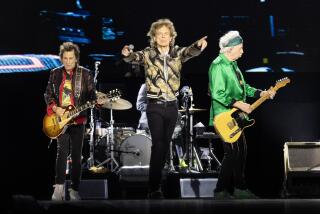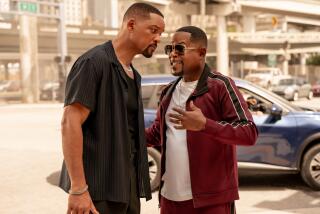MOVIE REVIEW : THROW IN THE TOWEL ON ‘ROCKY IV’
- Share via
Isolation is a terrible thing for any artist, but it’s worst of all for a movie maker who’s tasted success early. Unchallenged and unchecked, with no one to say nay and with no new influences on his work, he begins to feed on himself. You can see the results in the elephantine vacuousness of Sylvester Stallone’s “Rocky IV” (citywide).
To those who could perceive it, Rocky Balboa’s charm was that of a rough-hewn, clumsy-wid-woids palooka who made it against all odds, his little lady by his side. Significantly, “Rocky” was made under the control of an outside director, John Avildsen.
But since “Rocky II,” its author-star has been the director as well, and each succeeding movie has become bigger, emptier, more preposterous. Noisier, too. “Rocky IV” may be as far as that road will take him, pitting Rocky against a man “with an entire country in his corner,” the Soviet Union; 15 rounds in squishy, sweaty supercolossal close-ups with thundering sound effects like warring mastodons. “Rocky IV” also comes stuffed with the requisite numbers of MTV songs and generous dollops of flashbacks to recap anything you might have missed (or wished to forget) from the previous three.
In a plot unmarred by subtleties of any kind, the simple Stallion is pitted against a hyper-technological creation of the devious Soviets, with the outcome already given away by the movie’s poster. As Rocky, his loyal Adrian (Talia Shire), their son (Rocky Krakoff), their buddy Apollo Creed (Carl Weathers) and Paulie (Burt Young), hang around the eerily empty Balboa mansion, talkin’ about The Way of the Warrior, the U.S. sports world is invaded by Soviets.
A flat-topped, monosyllabic giant of a boxer, Ivan Drago (white-blond Dolph Lundgren, cast to stir memories of Hitler’s young, super Ayrians) arrives with about half the Politburo and his wife, Ludmilla (Brigitte Nielsen), to challenge America’s finest fighters.
Creed is first to take him on--in an exhibition match in Las Vegas whose staging makes the closing ceremonies of the Olympics seem understated and tasteful. The boxers rise and descend via hydraulic stages, there are show girls and chorus girls and laser beams and star filters and spangles and sequins and a pair of almost-lifesize fighter planes, and roughly 750,000 little American flags being waved by unsportsmanlike American fight fans, and James Brown writhing in the foreground and Russians sneering in the background. For starters.
The outcome sends Rocky straight back into the ring, for a match to be held in the Soviet Union on Dec. 25. (Presumably they are so godless that this date means nothing to them.) Rocky even trains there, in Siberia (odd, how Siberia looks like the Grand Tetons), in a crude farmhouse lit by kerosene, “using only the most primitive equipment.”
Furious intercutting: Rocky, pulling a Russian farmer’s horse-drawn wagon out of a snowdrift; Ivan, monitored by platoons of lab-coated scientists, lifting vast weights; a Christ-like bearded Rocky carrying a log across his shoulders like the true cross; Ivan hooked up to every piece of electronic equipment except a smoke detector, and on the steroid needle as well.
Like “White Nights,” “Rocky IV” says that Soviets are simplistic animals, incapable of loyalty or of decent human behavior. Stallone adds an interesting codicil: They may be far superior technologically, but not to worry--technology is no match for a pure heart. Finally, he tacks on a change of policy at the picture’s end, allowing for the possibility of growth, while denying it with every other frame.
For years, Stallone has encouraged us to blur the lines between Rocky and his creator, and as a portrait of life at the top, this is a deeply depressing film. For all the furious activity on the screen, these are hollow, isolated lives. The little Balboa family is huddled in this huge, dark empty pretentious house, which has no marks of their taste. There are no such things as old, comfortable clothes any more than there are old, comfortable friends, beyond Creed and Paulie who are co-starring players. When a new character is finally introduced, it’s a robot. (Let’s see a robot steal scenes or hanker for bigger billing.) Only in one parting scene between father and son do you feel Stallone’s real involvement with a co-actor.
We can never, never be trusted to catch an emotion or a fact on our own. In Stallone’s think-speak, characters forever sidle up to one another, confessing that “It’s hard for me to say these things,” but saying them anyhow. Exposition is ham-fisted: “In case you forgot, it’s been almost nine years since you been married to me.” (Shire manages to make Adrian something other than whiny, which cannot have been easy.)
This is grim and witless storytelling, and what makes it so depressing is that it hasn’t improved by so much as a chemical trace since the days of the first “Rocky.” Presumably, the action is what keeps audiences awake, but even that is becoming a foolish parody of itself. It’s lousy boxing anyway, these greased body builders squaring off at each other, and it seems to have gotten slower, showier and sillier with each sequel.
Nine years ago Rocky was like one of those pinkly charming, toylike Nicki de Saint-Phalle sculptures, his dumb muscles part of the fun. Now, he’s grown into a vast Rocky balloon in the Macy’s Thanksgiving parade. Hopelessly overinflated, it has broken its tether to float overhead, blotting out the sun. A little proportion, please. ‘ROCKY IV’
A United Artists presentation, distributed by MGM/UA Entertainment Co. Producers Irwin Winkler, Robert Chartoff. Executive producers James D. Brubaker, Arthur Chobanian. Writer, director Sylvester Stallone. Camera Bill Butler. Production design Bill Kenney. Editors Don Zimmerman, John W. Wheeler, Costumes Tom Bronson. Music Vince DiCola. Sound mixer Chuck Wilborn. Set decorator Rick T. Gentz. With Sylvester Stallone, Talia Shire, Burt Young, Carl Weathers, Dolph Lundgren, Brigitte Nielsen, Tony Burton, Michael Pataki, Dominic Barto, Danial Brown, James Brown.
Running time: 1 hour, 30 minutes.
MPAA-rated: PG (parental guidance suggested).
More to Read
Only good movies
Get the Indie Focus newsletter, Mark Olsen's weekly guide to the world of cinema.
You may occasionally receive promotional content from the Los Angeles Times.










